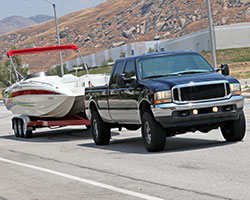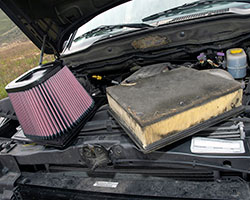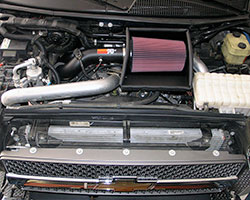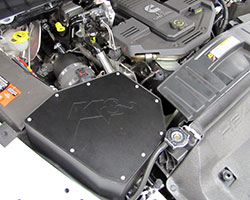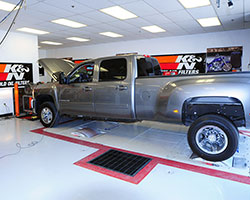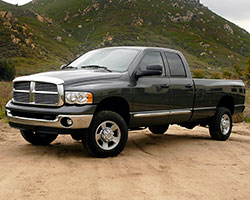Easy Diesel Performance with K&N Diesel Air Filter and Diesel Air Intake Options
- Sep 11, 2014
It wasn’t long ago that the term “Diesel Performance” would have been considered an oxymoron. A diesel engine has several advantages over a typical gasoline powered internal combustion engine but until recently performance was never considered one of those advantages. In the automotive world diesel engines have been known for their fuel economy, torque production, and longevity. In Europe diesel powered passenger cars are popular because a diesel engine will burn less fuel than an equivalent gasoline engine doing the same amount of work. Heavy duty diesels, such as semi-trucks, busses, and recreational vehicles have also exploited the fuel efficiency advantages of the diesel engine, but because of the distances these vehicles drive the ability of a diesel engine to last twice as long as a gasoline engine plays a major factor in choosing a diesel power plant. Modern advances in diesel performance technology have made diesel engines widely accepted as a positive alternative to gasoline burning engines. Gone are the days when a diesel was looked down upon for being slow, noisy, and dirty. Improvements in direct injection and forced induction have helped cure the arguments for diesel engines being slow. The issue of diesel noise, or “diesel clatter”, has been addressed with the improvements in direct injection, and electronic engine controls, as well as higher-quality diesel fuels. Tail pipe emissions from diesel powered vehicles have been improved in modern diesel engines by reducing waste fuel. It’s the wasted fuel in a diesel engine under load that produces black smoke, and this has been nearly eliminated with modern electronic engine and emissions controls.
While modern advancements in diesel technology have made a world of difference, these same advances have made improving diesel performance more difficult. The basic principal behind increased diesel performance is to increase air in the cylinders allowing more fuel to be burned and more horsepower and torque to be produced. Forced air induction, like that provided by superchargers and turbochargers, accomplishes the task of increasing air pressure loaded into the cylinder. However, most diesel engines are already equipped with forced induction from the factory. That’s where K&N air filters steps in with a diesel air filter or diesel air intake to improve diesel performance over the factory design. Most diesel cars and trucks are equipped from the factory with restrictive disposable air filters which are housed in a confined factory air filter box. After that, the air is routed through convoluted factory air intake tubing which disrupts, and can even impede, airflow into a diesel engine. By eliminating some or all of these points of restriction with a K&N diesel air filter, or diesel air intake system, K&N Air Filters is able to improve diesel performance by increasing horsepower and torque output.
Eliminating the restrictive disposable diesel air filter, constricted factory air filter box and the convoluted air intake tubing will reduce restriction and improve efficiency, but that is just part of the diesel performance equation. K&N engineers pay special attention to air temperature as it travels into the engine. Because cooler air has more mass it promotes more efficient combustion. The ability of an engine to work efficiently is essential to making power and improving diesel performance. The engine control unit (ECU) in modern diesel pickups and cars can adjust engine performance as air temperature increases forcing the engine to run more conservatively and make less power. This means diesel air filter and diesel air intake placement is important to assure proper flow, temperature, and quality of incoming air for peak diesel performance. When K&N engineers design a diesel air filter or diesel air intake much consideration is put into improving diesel performance without sacrificing engine protection with a K&N diesel filter. Normally a K&N diesel air filter is built to higher specifications than our standard automotive air filters. The typical K&N diesel air filter is made with deeper pleats for more surface area and more layers of cotton in different grades to achieve higher levels of filtration efficiency. K&N performs filtration efficiency testing following the internationally recognized ISO 5011 protocol to guarantee that our air filters will provide high airflow without sacrificing engine protection.. Diesel air filter filtration efficiency isn’t the only aspect of engine protection. A K&N diesel air filter, as well as a K&N diesel intake, undergoes airflow, dynamometer, and over-the-road testing to ensure that our product will improve diesel performance without causing drivability issues. Modern diesel engines are required by federal law to run within such narrow operating parameters that K&N engineers must be careful to increase diesel performance without upsetting electronic engine controls. K&N does its homework to ensure a K&N diesel air filter or diesel air intake system can provide improved diesel performance without the need for further modifications. K&N has been committed to improving diesel performance since the 1990’s when diesel engines became popular in full-size pickup trucks. A listing of K&N diesel air filter and diesel intake offerings can be found on the Diesel Filter Performance - Air Intakes & Air Filters page, or use the K&N product lookup tool to find a diesel air filter, or diesel air intake for your vehicle. |
|||||||
|
|||||||

